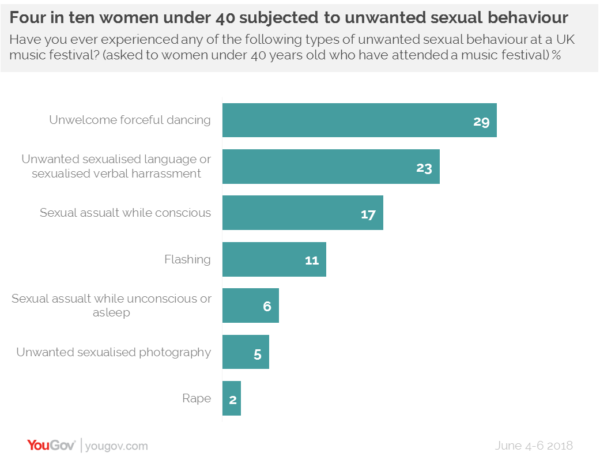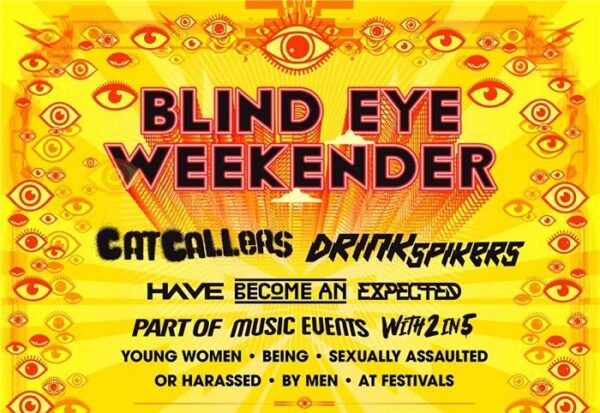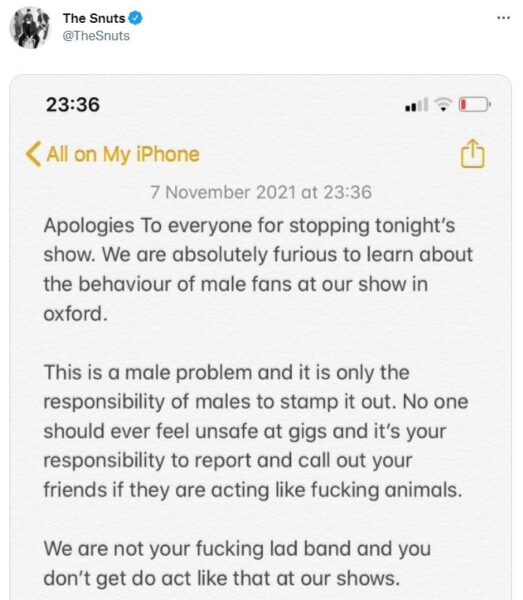
Male sexual entitlement and the music industry – how men can make a difference
Tom Johnson of independent music journal Gold Flake Paint looks at male sexual entitlement in the music industry and how men can make a difference.
When the #MeToo movement first took hold in 2016 it was a huge moment in society.
First originating in the film industry, the campaign helped to expose the terrible behaviour of some genuinely huge industry names who used their status and platform to get away with abuse for decades.
Ever since that foundation, and as the movement has rippled through social media to many other areas of daily life, there’s been an often unspoken supposition that it’s yet to have really taken hold in the same way within the music world.
Since the birth of popular music, and especially in its upper echelons, men continue to hold so much of the power, whether that be the obvious clichéd characters of men in suits signing off cheques or the more nuanced and murky gatekeepers who offer access and dangle carrots.
There have been a few heavyweight revelations that have come to light over the past half a decade, but the industry as a whole is still suffering greatly when it comes to underrepresentation.
As is so often the case, those more high-profile cases cause ripples that spread through the whole industry and inspire those far away from its epicentre to fight the good fight, from those aforementioned boardrooms right down to the small and sweaty 100-capacity venues that are the industry’s lifeblood – but are also riddled with problems.
The organisation Keychange defines itself as a “movement that counts the discounted”.
At its core, it’s a global network and movement, working towards gender equality in the music industry, and their eye-opening studies continue to highlight the huge gulf that exists between men and women across the industry as a whole, not just in the murkiness of ingrained misogyny but also in straightforward statistics such as the percentage of women signed to music publishers and record labels – or the lack thereof.
These findings and their causes are important because they set a tone that manifests itself in all manner of ways, many of which are also wider societal problems and continue to rear their ugly head far more prevalently than you might expect.
Towards the tail-end of 2021, The Independent newspaper published a thought-provoking piece that looked into the dangers that women continue to face when attending live concerts and festivals.
In the piece, they quote a 2018 YouGov poll which states that “nearly half (43 per cent) of female festival-goers under 40 have experienced sexual harassment”, a jaw-dropping number which makes for even worse reading when doubled-up with the findings from Claire Barnett – creator of the Women’s Safe Spaces Now project – who found that over 95% of women aren’t even reporting their experiences of sexual harassment and assault due to a lack of faith in their claims being taken seriously.

2018 YouGov poll highlights unwanted sexual behaviour at festivals
There are shoots of positivity though. Led by the caveat that they shouldn’t need to exist at all, there are great people doing great things to highlight these issues and make a demonstrable change.
Campaigners such as SGFW (Safe Gigs For Women), an initiative that works with “venues, promoters, artists and gig-goers to fight sexual assault and harassment at live music events” are shining a spotlight on these issues, while in Scotland, the not-for-profit Gig Safe Glasgow has been working at the forefront, stationing help desks in venues during shows and working with venue staff to bring in safeguard measures to prevent and respond to any acts of harassment and discrimination that take place on the night.
There was also an inspired campaign by White Ribbon UK, the leading charity when it comes to violence against women.
White Ribbon’s aim is to engage with men and boys to help prevent such behaviours, and in 2021 they worked with Wunderman Thompson, the New York-based global marketing communications agency, on a series of gig posters that aimed to encourage men to “individually and collectively take responsibility to end male violence toward women and make festivals, and society as a whole, a safer place.”

One of White Ribbon UK’s campaign posters
More and more, the onus is finally being put on men themselves to take responsibility for their own actions and of the men around them.
On a wider scale, it has been left to women to shout up for themselves, while so many of us men continue to turn a blind eye – even if unintentionally.
As is the case with the misogyny that is deep-rooted across society, it’s not just high-profile cases of abuse that need examining, but also the smaller daily occurrences of anti-women bias and gender stereotypes that all men can have a hand in combating.
Evidence shows that dangerous behaviour towards women grows from much smaller seeds of casual misogyny, many of which have been ingrained in our culture over the previous years.
It’s only the very recent past, for example, where “lad rock” was seen as a genre in itself, leading to spaces where women were either sexualised in the lyrics or seen as the butt of the joke, and accompanying live shows where women being made to feel unsafe was just a part of the experience.
If the tide is to fully turn it needs men to lead from the front, to educate themselves on the problem and open up difficult conversations between themselves and within friendship groups before it’s already too late.
Towards the end of 2021, Scottish indie rock band The Snuts took to Instagram immediately after a gig in Oxford to apologise for stopping the show mid-performance.
“We are absolutely furious to learn about the behaviour of male fans at our show,” the band said.
“This is a male problem and it is only the responsibility of males to stamp it out.
“No one should ever feel unsafe at our gigs… and you don’t get to act like that at our shows.”
The band’s post was – mostly – widely commended, greeted by a wave of positivity from their fans not only for calling out the inappropriate behaviour but also for clarifying that it was on the men in attendance to be a part of the solution, not simply the problem.

The Snuts respond to inappropriate behaviour
This way of thinking still seems a somewhat fringe idea, but it’s crucial for the long game of demonising bad sexual habits, not dismissing them or, at worst, glorifying them.
The Snuts’ fanbase tends to veer towards a younger audience and you have to think that such a strongly worded post – as well as their actions in the moment, in stopping the show – will have helped at least one male in the audience consider their actions, as well as the actions of their friends, and those around them, leading them to perhaps act differently in the future.
It’s incredibly infuriating that such things are still happening, but in their own small way, the response from The Snuts should instigate a healthy dose of self-reflection and begin to normalise the idea that it is time for men to pick a side now, rather than continue to casually sit on the fence.
Their response opens up the opportunity for much-needed conversations around toxic masculinity to take place within younger groups of males about their own behaviour and the power they have to make a difference.
While it’s also entirely fair to say that those conversations are difficult to have – the time for change has to be now.
As men, we have the option to turn a blind eye and suffer no direct consequences as a result of that decision, and that’s undoubtedly a huge part of the problem.
There will always be those that say such things don’t matter, that music should exist in its own special bubble where we get to just sing and dance and sweat and forget the harsh realities of the world for a while, but that notion comes from a place of huge privilege and isn’t true for a vast number of women who are wanting to share that same experience.
The current live music scene, especially across the festival circuit which continues to grow and grow, is full of young and impressionable fans and that should be seen as an opportunity to be taken.
For all its faults, and at its very best, music has so often been a vehicle for societal change, helping to steer some of us toward a brighter future and shine a light on injustice.
There is so much work still to do in the music industry but that isn’t an excuse to not even try.
Voices need to be heard and actions need to be taken: from behind the scenes, and from the stage to the pit, it’s time for conversation and action.
What’s being asked for here is the bare minimum: for those with a platform to use it, to appreciate that your words and actions can have a serious and meaningful impact on the women around you.
SUPPORT
You can find advice and information on the Police Scotland website
Call Police Scotland on 101 or contact the Rape Crisis Scotland national helpline for free on 08088 01 03 02 (daily 6pm-12 midnight).
In an emergency always call 999.
